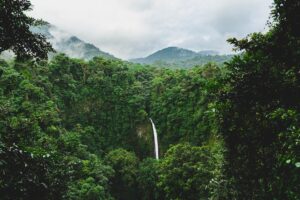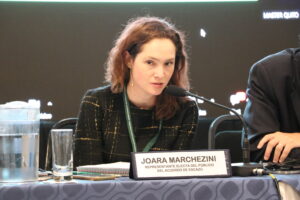Four Ways to Strengthen Environmental Rights
Cuatro Maneras para Fortalecer los Derechos Ambientales
Latin America and the Caribbean adopted the Escazu Agreement to guarantee the rights of all people to have a healthy environment, to develop sustainably, and to fight against inequality and discrimination.
An open state – which strengthens transparencyAccording to OGP’s Articles of Governance, transparency occurs when “government-held information (including on activities and decisions) is open, comprehensive, timely, freely available to the pub... More, collaboration and participation in the three branches of the state – and the Escazu Agreement share the guiding principles of access to public information, citizen participationAccording to OGP’s Articles of Governance, citizen participation occurs when “governments seek to mobilize citizens to engage in public debate, provide input, and make contributions that lead to m... More, and justiceTo address barriers that prevent citizens from having their justice needs met, OGP participating governments are working to expand transparency, accountability, and inclusion into all systems of justi... in environmental matters. However, there are challenges to successfully implement the environmental treaty that involve the justice sector. This is where the lessons learned from the open government processes carried out by the Open Government PartnershipThe Open Government Partnership (OGP) is a multi-stakeholder initiative focused on improving government transparency, ensuring opportunities for citizen participation in public matters, and strengthen... More (OGP) in the different countries can help ensure that the Escazu Agreement reaches its goals and does not remain as simply good intentions.
To support these efforts, in 2023 the International Network for Open Justice (RIJA) launched a new working group: Open Environmental Justice, which aims to synthesize environmental justice and open justiceAn open, independent, and impartial justice system serves as a foundation for better access to justice by fulfilling all people’s civil liberties and allowing individuals to more effectively protect....
Here we share four issues of the Escazu Agreement that can be addressed from a justice perspective.
Access to public information
Public information is a central element to promote the involvement of all people in environmental matters. That’s why information should be delivered through clear and simple procedures that comply with the principles of the right of access to public information. The data should be delivered and published in open formats, have clear language, and be accessible.
| Example: Disseminate and publish the sentences handed down by the justice sector on environmental issues through active transparency so that the existing information is easily available to the defenders of this right. |
Training
Training justice practitioners on environmental justice can help successfully implement the Escazu Agreement from an open justice perspective. It is essential that both the justice officials and the holders of the right to a healthy environment know the rules, processes, scope, existing resolutions, and the possibilities of intervention in environmental matters so they can apply and exercise that right.
| Example: Incorporate the Escazu Agreement and environmental issues from a human rights perspective in the curricula of the different educational instances and in judicial training. In Argentina, for example, the Michaela Law sets mandatory gender and gender-based violence training for all people who work in public office and the Yolanda Law sets mandatory environmental training for all public servants. |
Citizen participation
Any intervention in the environment must ensure respect, protection, and fulfillment of the rights of all people. That’s why the involvement of citizens in all stages of environmental processes is essential. To guarantee this involvement, participation should begin as early as possible with methodologies designed to create trust and foster quality discussions.
| Example: The judiciaryWhile a majority of open government reforms occur within the executive branch, OGP members are increasingly taking on commitments to increase the openness of the judicial branch. Technical specificati... could use citizen participation tools such as Amicus Curiae presentations,where people without a direct interest in the cause provide arguments to the courts that can be used to expand evidence or develop a case, public hearings, and citizen consultations before preparing a sentence on an environmental issue that affects collective rights. |
Strategic Alliances
The care and protection of the environment are a shared responsibility of the three powers of the State, the private sectorGovernments are working to open private sector practices as well — including through beneficial ownership transparency, open contracting, and regulating environmental standards. Technical specificat... More, and citizens. It is essential to promote and encourage alliances between these sectors throughout the different stages of the Escazu Agreement.
| Example: Develop a public scheme of incentives for the involvement of the private sector and respect for the environment. There are compensation programs for greenhouse gas emissions produced by a company by obtaining carbon credits (e.g. Cabify). |
These are some of the proposals governmental, civil society and academic organizations that participated in a recent workshop organized by OGP, ECLAC, and Universidad Hemisferios at the second meeting of the Conference of Parties to the Escazu Agreement (COP2) shared as ways to guarantee safe and equitable conditions for citizens have an effective access to information, public participationGiving citizens opportunities to provide input into government decision-making leads to more effective governance, improved public service delivery, and more equitable outcomes. Technical specificatio..., and justice in environmental matters. As the open government community prepares to implement OGP’s 2023-2028 strategy, where justice and environment issues are high priorities, it is more important than ever to ensure that we can align these two agendas and capitalize on the opportunities that are presented to strengthen the environmental rights of all.
América Latina y el Caribe adoptó el Acuerdo de Escazú con el propósito de garantizar los derechos de todas las personas a un medio ambiente sano, al desarrollo sostenible y luchar contra la desigualdad y la discriminación.
El Estado Abierto – fortalecer la transparencia, colaboración y participación en los tres poderes del Estado- y el Acuerdo de Escazú comparten los principios rectores de acceso a la información pública, participación ciudadana y justicia en asuntos ambientales. Sin embargo, existen desafíos para lograr el éxito en la implementación del tratado ambiental que involucran también al sector justicia. Es aquí donde los aprendizajes obtenidos a partir de los procesos de gobierno abierto llevados adelante por la Alianza para el Gobierno Abierto en los diferentes países pueden ayudar a que el Acuerdo de Escazú no quede simplemente en buenas intenciones.
Para apoyar estos esfuerzos, la Red Internacional de Justicia Abierta (RIJA) lanzó en 2023 un nuevo grupo de trabajo: Justicia Ambiental Abierta, que pretende hacer esta síntesis entre la Justicia Ambiental y la Justicia Abierta.
Acá te compartimos cuatro temas del Acuerdo que pueden ser abordados desde una perspectiva de Justicia.
Acceso a la Información Pública
La información pública es un elemento central para promover la participación ciudadana y el involucramiento de todas las personas en los asuntos ambientales. Para ello es necesario que la información se entregue mediante procedimientos claros y sencillos que cumplan con los principios del derecho de acceso a la información pública. También que los datos entregados y publicados se encuentren, en la medida de lo posible, en formatos abiertos; y se utilicen las herramientas de lenguaje claro y accesible para la producción de información.
| Ejemplo: Difundir y publicar a través de transparencia activa las sentencias que dicta la justicia sobre cuestiones ambientales para que los y las defensoras/es de este derecho tengan disponible de manera sencilla toda la información existente. |
Capacitación
La capacitación de practicantes de la justicia sobre este tema permite implementar exitosamente el Acuerdo de Escazú desde la perspectiva de Justicia Abierta. Es fundamental que tanto los/as efectores/as de justicia como las personas titulares del derecho a un ambiente sano conozcan las normas, los procesos, los alcances, las resoluciones existentes y las posibilidades de intervención en materia ambiental. De esta manera podrán aplicar y/o ejercer aquel derecho.
| Ejemplo: Incorporación en la currícula de las diferentes instancias educativas y también en la formación judicial el Acuerdo de Escazú y la temática ambiental desde una perspectiva de derechos humanos. En Argentina, por ejemplo, existe la Ley Micaela, que establece la capacitación obligatoria en género y violencia de género para todas las personas que se desempeñan en la función pública. También está vigente la Ley Yolanda para la capacitación obligatoria de todos/as las/os servidoras/os públicas/os en materia ambiental. |
Participación ciudadana
Toda intervención sobre el medio ambiente debe asegurar el respeto, la protección y la realización de los derechos de todas las personas. Para ello, el involucramiento de la ciudadanía en todas las etapas de los procesos ambientales es fundamental. Para garantizar ese involucramiento es necesario que la participación se posibilite de manera temprana y que se generen metodologías para crear confianza y obtener discusiones de calidad.
| Ejemplo: Los poderes judiciales podrían usar las herramientas de participación ciudadana como los Amicus Curiae – presentaciones de personas ajenas a la causa que aportan argumentos a los tribunales y que pueden servir para la ampliación de prueba o desarrollo de un caso-, las audiencias públicas y las consultas ciudadanas antes de elaborar una sentencia sobre un tema ambiental que afecte los derechos colectivos. |
Alianzas estratégicas
El cuidado y protección del medio ambiente son una responsabilidad compartida de los tres poderes del Estado, del sector privado y de la ciudadanía. Es fundamental promover e incentivar las alianzas entre los diferentes sectores en las distintas etapas que aporten a la consecución de los objetivos del Acuerdo de Escazú.
| Ejemplo: Elaborar un esquema público de incentivos para el involucramiento del sector privado y el respeto al medio ambiente. Existen programas de compensación de la emisión de gases de efecto invernadero que produce una empresa mediante la obtención de créditos de carbono (Ej. Cabify) |
Estas son algunas de las propuestas cocreadas con diferentes organizaciones públicas, de la sociedad civil y académicas que participaron del Taller “Tendiendo puentes entre Escazú y Gobierno Abierto” organizado por OGP, CEPAL y Universidad Hemisferios en la CoP2 que entendemos pueden ser un acercamiento para garantizar a la ciudadanía condiciones seguras y equitativas en el acceso efectivo a la información, a la participación pública y a la justicia en asuntos ambientales. A medida que la comunidad de gobierno abierto se prepara para implementar la estrategia 2023-2028 de OGP, en donde los temas de justicia y ambiente son de alta prioridad, es más importante que nunca asegurarnos que podamos alinear estas dos agendas y capitalizar las oportunidades que se presenten para fortalecer los derechos ambientales de todos y todas.
No comments yet
Related Content

Open Government and the Escazú Agreement
 Challenges and Solutions
Challenges and Solutions Faces of Open Government: Joara Marchezini
Joara Marchezini is a specialist on access to information and the Public’s Representative to the Escazu Agreement. Joara, originally from Brazil, sat down with OGP to...

To Protect the Environment, Protect the Defenders
In this episode, Felipe Pino, an environmental lawyer from Chile, shares his insight environmental democracy, the need for public participation in responding to climate crises, and the significance of the…


Leave a Reply